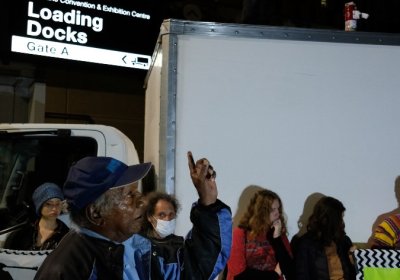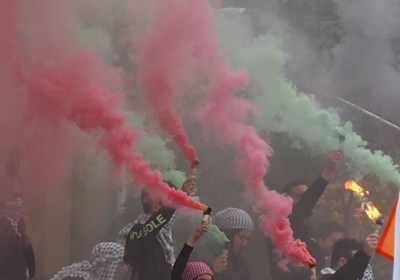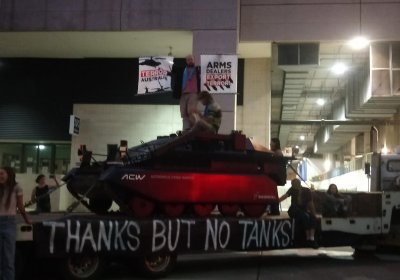Standing up against the war profiteers at the Land Forces exhibition in Brisbane was a rainbow coalition of First Nations peoples, peace, climate and human rights defenders. Alex Bainbridge, Jim McIlroy and Steffi Leedham report.
Imperialism & war
Renee Lees reports that residents protested outside the site of the world’s biggest arms dealers — Thales and BAE Systems — as part of the Disrupt Land Forces action.
In violation of its obligations and responsibilities as an occupying power, Israel has taken little effort in vaccinating Palestinians, reports Jyotsna Singh.
Thousands marched through Sydney in solidarity with Palestine on May 30, reports Peter Boyle.
Filmmaker and author John Pilger spoke to his 2002 documentary comparing Israel’s occupation of Palestine to South Africa's brutal apartheid regime, reports Rachel Evans.
We are witnessing barbaric aggression visited upon hapless Palestinians as part of the Zionist Establishment's project of ethnic cleansing, argues John Ebel.
In a spectacular start to the Disrupt Land Forces, anti-militarism activists blocked two military vehicles from entering the Brisbane Convention Centre, reports Kerry Smith.
Moroccan authorities have set in motion a wave of migration to the Spanish enclave of Ceuta to punish it for providing hospital care to leaders of the Polisario Front, writes Dick Nichols.
The new stage of Palestinian resistance has caught the Israeli government by surprise. It also shocked the United States government, reports Barry Sheppard.
Marches and rallies in solidarity with the Palestinians have taken place across the United States, reports Malik Miah.
South African Transport and Allied Workers Union members have refused to offload an Israeli ship in protest against Israel’s war on Palestine, reports Markela Panegyres.
Rihab Charida, Antony Loewenstein and Abe Quadan discuss Israel's latest assault on Palestine and what makes this moment historic on the latest episode of the Green Left Show.
- Previous page
- Page 146
- Next page











